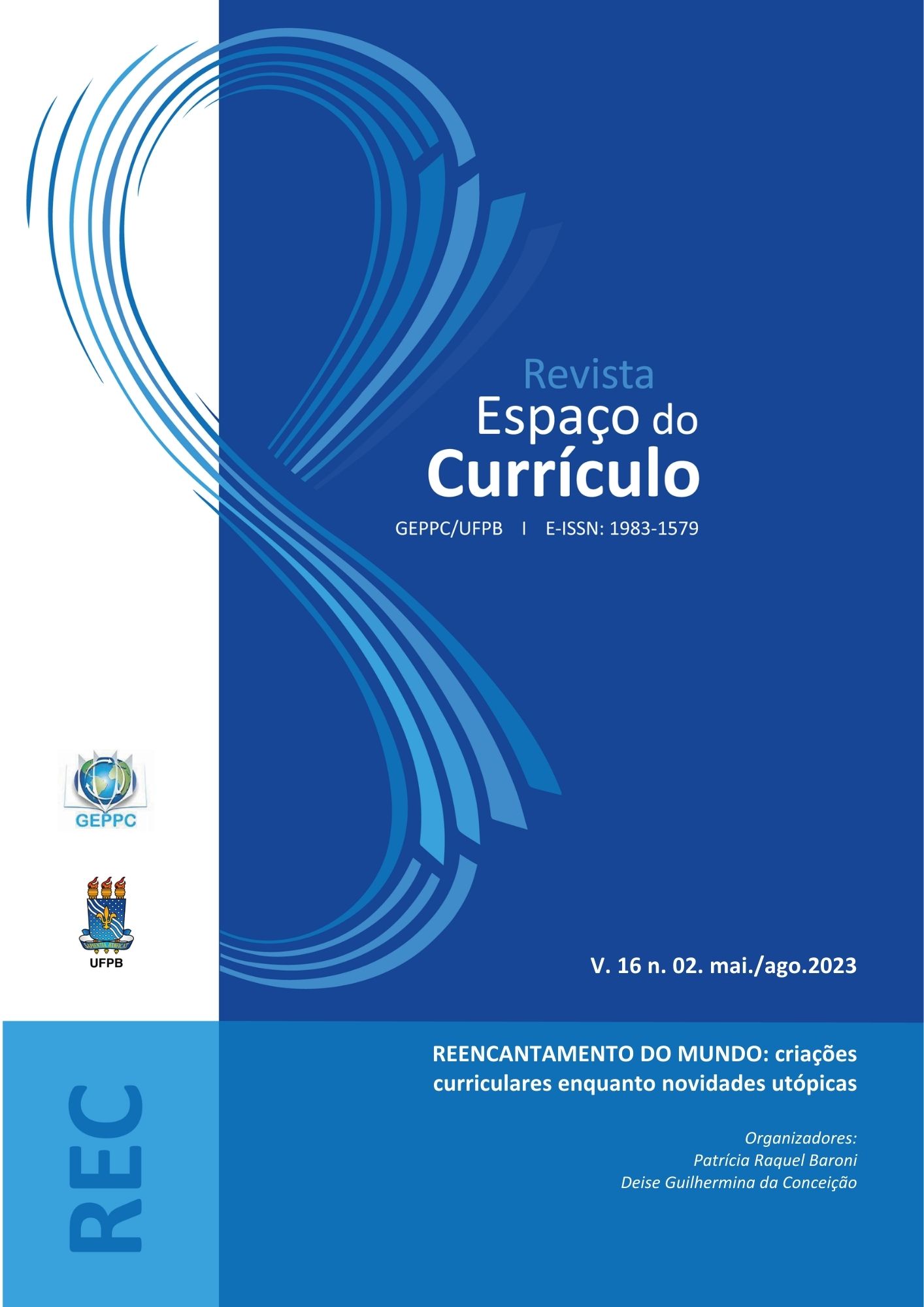CURRICULUM AND IDENTITIES
approximations between education, culture and inclusive social archeology at the Casa Grande foundation in Nova Olinda-CE
DOI:
https://doi.org/10.15687/rec.v16i2.67402Keywords:
Curriculum, Education, Inclusive Social ArchaeologyAbstract
The construction of identities goes through a process of socialization, through the relationship with cultures through training paths, adding elements articulated by formal and non-formal educational institutions. Inclusive Social Archeology, at the Casa Grande Foundation, in Nova Olinda-CE, constitutes a training practice that encourages the rescue of memory, identities and connects subjects to cultures, history, the geography of the place and with the tangible and intangible materials that make up the field of education, building belonging through a performative pedagogy, in a relationship between hidden curriculum, education and culture. The main objective of the research was to analyze Inclusive Social Archeology as a training tool at the Casa Grande Foundation in Nova Olinda - Ce, as well as its approximations with cultures, identities and the non-formal educational process of children and adolescents assisted. Therefore, a theoretical dialogue about the meanings of culture, education, curriculum, the relationship between curriculum and culture and the construction of identities was necessary. An ethnographic research was developed, through participant observation, with focus groups and application of semi-structured questionnaires. Data were processed through content analysis, presented in the course of the text, through a qualitative approach. It was concluded that the Casa Grande Foundation plays a leading role in Cariri due to its emancipatory educational practices and the appreciation of memory and ethnographic productions, in addition to taking into account the assumptions of Inclusive Social Archeology as an instrument for the formation of the curriculum not formal.
Downloads
Metrics
References
ARROYO, M. G. Currículo, território em disputa. 5. ed. Petrópolis, RJ: Vozes, 2013.
AUGÉ, Marc. O antropólogo e o mundo global. Trad. Francisco Morás. Petrópolis, RJ: Vozes, 2014.
BARRETO, Cristiana. Arqueologia brasileira: uma perspectiva histórica e comparada. Revista do Museu de Arqueologia e Etnologia. Suplemento, 1999.
BERGER, P. L.; LUCKMANN, T. A construção social da realidade: tratado de sociologia do conhecimento por Peter L. Berger e Thomas Luckmann. 34. ed. Petrópolis: Vozes, 2012.
BRANDÃO, C. R. O que é educação. São Paulo: Brasiliense, 2007.
BRASIL.http://portal.iphan.gov.br/uploads/ckfinder/arquivos/Carta%20de%20Atenas%201931.pdf. . 2004. acesso em 20 de novembro de 2022.
BOURDIEU, P. O poder simbólico. Rio de Janeiro: Bertrand Brasil, 1989.
CANDAU, V. M. Didática crítica intercultural: aproximações. Petrópolis, RJ: Vozes, 2012.
DOMINGUES, J. M. Sociologia e modernidade. Rio de Janeiro: Civilização Brasileira, 2005.
FREIRE, P. Pedagogia do oprimido. 17. ed. Rio de Janeiro: Paz e Terra, 1987.
FREIRE, P. Pedagogia da autonomia: saberes necessários a prática educativa. São Paulo, Brasil: Paz e Terra, 1997.
FUNARI, P. P. A.; FUNARI, R. S. Educação patrimonial: teoria e prática. In: SOARES, A. L. R.; KLAMT, S. C. (Org.) Educação patrimonial: teoria e prática. Santa Maria: Editora da UFMS, 2008, p. 11-21.
GEERTZ, C. A interpretação das culturas. Rio de Janeiro: LTC, 2008.
GIROUX, H. Pedagogia radical: Subsídios. São Paulo: Cortez, 1983.
HALL, S. A identidade cultural na pós-modernidade. Rio de Janeiro: DP&A, 2006.
HALL, S. A centralidade da cultura: notas sobre as revoluções de nosso tempo. Educação e realidade, Porto Alegre, v. 22, n. 2, 1997.
JOSSO, Marie Christine. A transformação de si a partir da narração de histórias de vida. Educação, v. 30, n. 63, p. 413-438, 2007.
LIBÂNEO, J. C. Didática. 2. ed. São Paulo: Cortez, 2013.
LIMAVERDE, R. Arqueologia social inclusiva: a Fundação Casa Grande e a gestão do patrimônio cultural da Chapada do Araripe. 2015. Tese (Doutorado em Arqueologia) – Universidade de Coimbra, Portugal, 2015.
MAGNANI, José Guilherme Cantor. Etnografia como prática e experiência. Horizontes antropológicos, v. 15, p. 129-156, 2009.
MATTOS, C. L. G. Etnografia e educação: conceitos e usos. Campina Grande: EDUEPB, 2011.
MOREIRA, A. F.; CANDAU, V. M. (orgs). Multiculturalismo: diferenças culturais e práticas pedagógicas. Petrópolis: Vozes, 2014.
OLIVEIRA, R. C. O trabalho do etnógrafo. Brasília: Editora Paralelo 15, 1998.
PEIRANO, M. A favor da etnografia. Rio de Janeiro: Relume Dumará, 1995.
SACRISTÃ, J. G. (org.) Saberes e incertezas sobre o currículo. Porto Alegre: Penso, 2013.
SILVA, T. T. Documentos de Identidade: uma introdução às teorias de currículo. 3. ed. São Paulo: Editora Autêntica, 2010.
SILVA, T. T. O currículo como fetiche: a poética e a política do texto curricular. Belo Horizonte: Autêntica, 2010.
SODRÉ, M. O terreiro e a cidade: a forma social do negro brasileira. Rio de Janeiro: Mauad X, 2019.
SOUSA, J. M. A etnografia ao serviço do currículo. In: FLÁVIO, A. et al. Globalização e (des)igualdades: os desafios curriculares. Braga: Universidade do Minho, 2007. p. 237-246.
TADEU, T. S.; MOREIRA, A. F. (orgs.). Currículo, cultura e sociedade. 12. ed. São Paulo: Cortez, 2013.
XIMENES. M. M. “Aqui, tudo se cria, nada se copia.”: um estudo etnográfico da ONG Fundação Casa Grande e a formação cultural de jovens moradores de Nova Olinda – CE. 2014. Dissertação (Mestrado em Comunicação) - Universidade Federal do Ceará, Instituto de Cultura e Arte, Fortaleza, 2014.
Downloads
Published
How to Cite
Issue
Section
License
Copyright (c) 2023 Curriculum Space Journal

This work is licensed under a Creative Commons Attribution 4.0 International License.
By submitting an article to Curriculum Space Journal (CSJ) and having it approved, the authors agree to assign, without remuneration, the following rights to Curriculum Space Journal: first publication rights and permission for CSJ to redistribute this article. article and its metadata to the indexing and reference services that its editors deem appropriate.
















